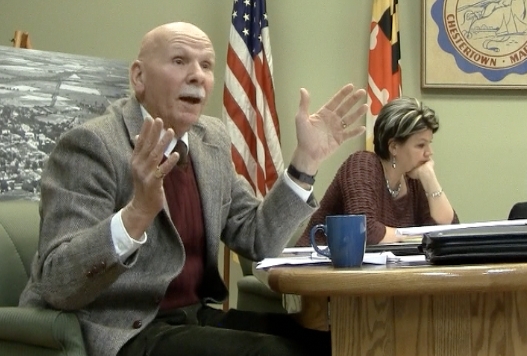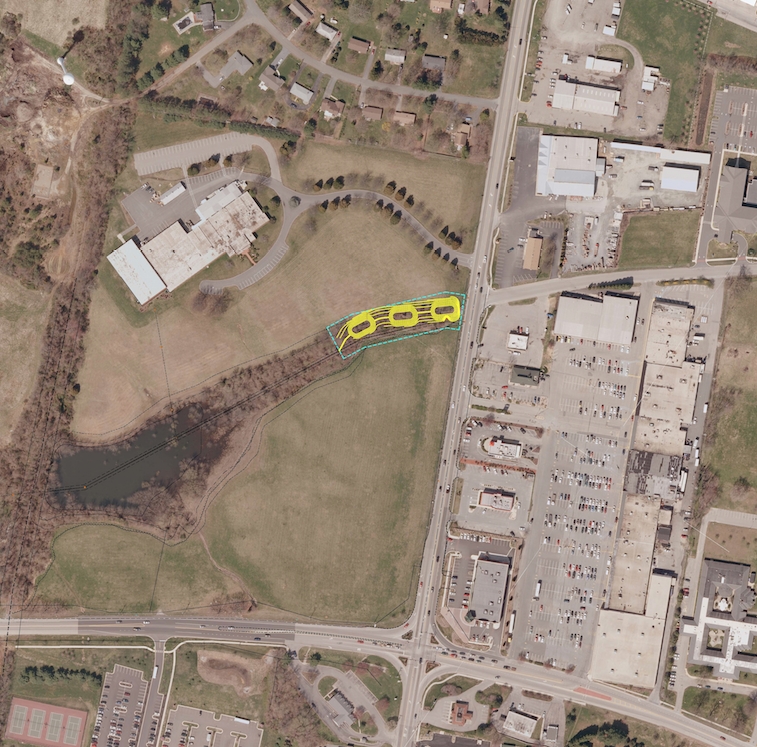Ward 4 Councilman Marty Stetson is upset that a local firm did not win a stormwater management contract because of the stringent qualifications he believes were unfairly set by the town’s zoning administrator, Kees de Mooy.
Unity Landscaping of Church Hill bid $245,000, about $100,000 less than the winning bid, to build a Step Pool Storm Conveyance System off Washington Avenue — across the street from the Kent Plaza Shopping Center where LaMotte Company and Washington College share a property line.

Ward 2 Councilman Marty Stetson reads the riot act to the town’s zoning administrator, Kees de Mooy, for disqualifying Unity Landscaping from a stormwater project off Washington Avenue, Thursday, March 4, 2013
Stetson said he wanted the money to stay local to help support local businesses and local jobs and that Unity was up to meeting the requirements of the contract.
But De Mooy said that Unity didn’t have the experience to do the job. De Mooy set a requirement in the bid process that contractors have five years of experience building Step Pool systems.
“We have an engineer that vows [Unity] has done the same kind of work,” Stetson argued.
“His business is here, his employees are here and that money will stay here in this area,” Stetson said, referring to Unity President Michael Jensen. “Those employees will go to our grocery stores.”
The system will consist of three stormwater collection pools to mitigate runoff from 52-acres of impervious surfaces on the east side of Washington Avenue, which include the shopping center, De Mooy said.
“The most important qualification that had to be met in the [bidding process] is that the contractor…have five years of experience in Step Pool Conveyances,” De Mooy said at Tuesday’s meeting of the Chestertown Town Council.
De Mooy said getting permits for the project had “been incredibly complicated because this type of stormwater infrastructure is relatively new.” He said the permit process with state and federal agencies took over two years and the town is now faced with a tight deadline of June to complete the project.
“The EPA, Army Corps of Engineers, MDE, DNR and other agencies are watching this project and it was a major concern of mine that this project be done by a fully qualified contractor who has built these types of facilities before.” De Mooy said these particular systems have only been around for about seven or eight years.
De Mooy said Unity was unable to demonstrate even one year of equivalent experience or bring on a qualified engineer with the required experience in Step Pool construction.
The town’s consultant for the project, Kevin Shearon of DMS & Associates, agreed with De Mooy’s decision to hire a more experienced contractor because Step Pool projects “are not an exact science.”
“There are field conditions that need to be analyzed and responded to in the field,” Shearon said. “That’s where we feel the experience is most needed for the contractor. We were not opposed to somebody [without experience] bringing someone on as a consultant during the construction that could be in the field, but we didn’t feel that the two lowest bidders brought that to the table.”
The winning bid came in at a little over $350,000 from Environmental Quality Resources, LLC of Millersville, Maryland. De Mooy said the firm met the five-year requirement.
Ward 3 Councilman Sam Shoge moved to approve the contract — putting full faith in De Mooy’s judgment.
“He has a much better understanding of the big picture when it comes to choosing [contractors] so let us defer to his judgment,” Shoge said.
Mayor Chris Cerino agreed with Shoge.
“We hire people and essentially delegate responsibilities,” Cerino said regarding De Mooy’s choice of the contractor. “We need to trust that they know what they’re doing,”
The council voted 4-1 to approve the bid from the Millersville firm. Stetson was the dissenting vote.
Unity Landscaping President Michael Jensen told the Spy on Thursday that he was more than confident his company could complete the work. He said he submitted 33 projects his company has completed in stormwater rejuvenation.
“I wouldn’t have bid the job if I didn’t think we were up to it,” Jensen said.
There is roughly $500,000 in state and federal money committed to the project. A 2010 Bay Restoration Grant to the Kent County funded about $80,000 for the project and the Trust Capital Implementation Fund has provided an additional $442,000. Both funds are managed by DNR.




terri smith says
I agree whole heartedly with Mr. Stetson. A local contractor should have gotten the contract IF they can do this type of construction & have proof of same. The one thing Mr. Stetson did get wrong is the phrase “grocery stores”. Sorry, we only have the 1 and it’s amazing how the prices went up in it when the other one closed.
Marty Stetson says
Editor,
I represent all the citizens of Chestertown but was elected from the fourth ward not the second.
Kevin Shertz says
As a professional in the industry, I can see both sides of this situation. I don’t fault either party for their opinions on the matter.
If June is the deadline for the work to be performed, and the stipulation that the firm have 5 years of experience, it is to help ensure (or guarantee in the contract) that deadline can be met so the funding does not go away. I can 100% see where Kees (and by extension, the Town) are coming from. This is not at all an unreasonable request. RFP’s (Requests for Proposal) have these sorts of requirements routinely.
At the same time, how does a firm acquire ‘experience’ on such projects without being given the opportunity to do them? It would have been nice to see if there would have been a way for Unity to do the work and provide financial guarantees (and appropriate penalties) that the work would be completed by the deadline, but the numbers for that type of situation simply may have not made sense for either Unity or the Town. I have worked on many jobs over my 20+ year career in the industry that provided financial incentives (and penalties) that revolved around a reasonable completion date.
And, we all must remember… two, five, or ten years down the road… what the community will remember is the built outcome of the project.
Hope it goes well.
Albert Townshend says
Editor,
Mr. Stetson brings up a good point. If the town and county are to become economically viable again or stay viable, we have to begin working hard to help the businesses in our community. It makes no sense directing taxpayers money out of the town and county when it could just as easily stay here. Looking further ahead regarding rules and regulations to provide better opportunities for local businesses would go a long way in showing the community that our elected officials are dedicated to the health and welfare of local businesses.
Keith Thompson says
Editor,
I can understand both points of view here as I think it’s admirable for Mr. Stetson to push for local contractors to do work at the lowest bid while I can understand the need for having a more experienced contractor to do work that is partially being funded by federal and state grant money. However, there’s one particular argument from Mr. Stetson that leaves me a bit perplexed, to quote: “his business is here, his employees are here and that money will stay here in this area,” Stetson said, referring to Unity President Michael Jensen. “Those employees will go to our grocery stores.” I think what’s missing from that is that people who will work in Chestertown will likely be spending money in Chestertown, regardless if the company is based in Chestertown, Church Hill or Millersville. While the EQR employees may not wind up spending money at Acme; I think it is highly likely that they’ll be buying lunch at one of Chestertown’s restaurants, buying sodas or snacks at one of Chestertown’s convenience stores, or buying gas at one of Chestertown’s gas stations. I’m from out of town but I’m an employee here and I’ve never stepped foot in a Chestertown grocery store because I don’t need to; but I eat at the town’s restaurants, get snacks from the convenience stores, buy gas at the gas stations, drink beer in the bars, and have even bought a guitar from the music store. I don’t think you can discount the economic impact from people who work in Chestertown, no matter where they happen to sleep at night.